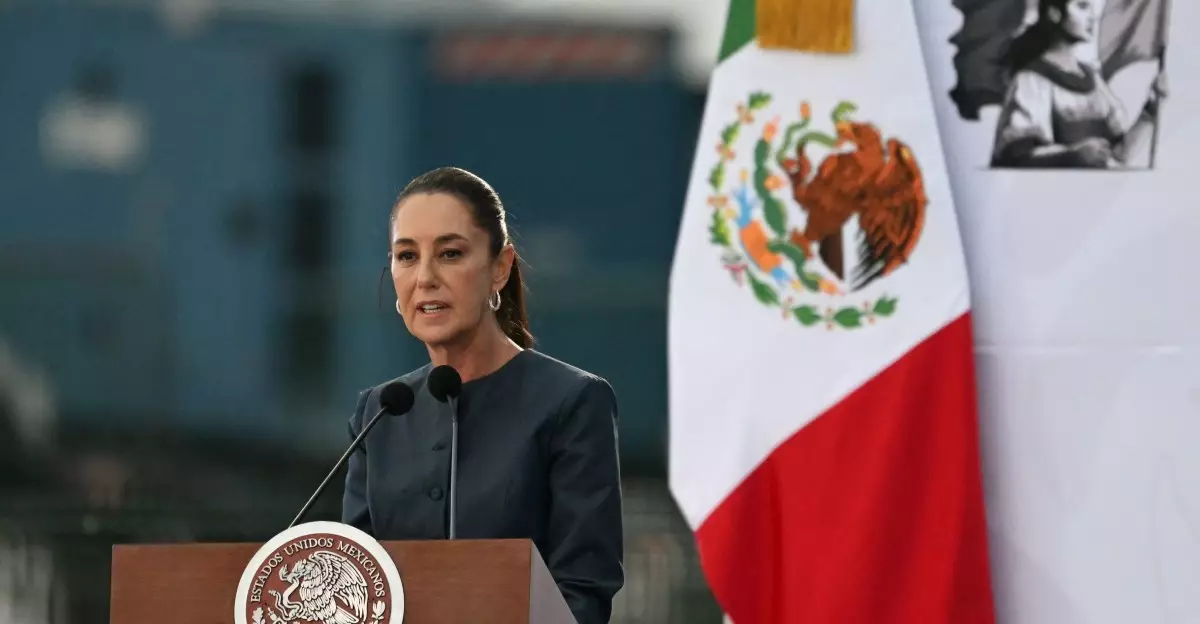The ongoing struggle over the nomenclature of the Gulf of Mexico highlights a complex interplay between territorial sovereignty, digital platforms, and international relations. The recent announcement by Mexican President Claudia Sheinbaum to initiate legal action against Google for its re-labeling of the Gulf raises pertinent questions about the authority that countries hold over geographical identities in a rapidly globalizing digital landscape. Sheinbaum’s lawsuit is not merely a fight over semantics; rather, it serves as a critical case study on how territorial disputes affect even tech companies, which traditionally operate as neutral entities.
Sheinbaum asserts that the name “Gulf of America,” propagated by Google Maps for users outside Mexico, violates the international norms of geographic nomenclature. This incident came in the wake of former President Trump’s controversial decree that sought to assert U.S. dominance even in matters of geographical designation, thus raising fundamental questions about sovereignty and the power of digital platforms to influence public perception.
The Role of Tech Giants in Geopolitics
Tech companies like Google are often regarded as apolitical entities, focusing instead on profit margins and user engagement. However, their decisions can significantly sway public opinion and even diplomatic relations. By rebranding the Gulf of Mexico, Google inadvertently took a political stance aligning with a specific U.S. narrative. Sheinbaum’s lawsuit serves as a reminder that the ramifications of digital platforms extend beyond mere business; they now shape international discourse and relations.
What is alarming is the ease with which a platform can alter geographical identities. It raises concerns about how power dynamics may shift in the digital age when established national sovereignty can be undermined by the digital actions of corporations. The quick compliance with Trump’s decree by Google, as well as Apple and MapQuest’s varying responses, illustrate the lack of a definitive code of ethics for such platforms regarding national nomenclatures. Should tech companies be held accountable for the geopolitical implications of their actions, especially when facing pressure from governments?
The Implications of Legal Action Against Corporations
Sheinbaum made it clear that while her government respects U.S. law, it also demands adherence to international norms. This position places Google in a particularly precarious situation, as the tech giant must navigate between complying with U.S. mandates and adhering to international expectations. In her statements, Sheinbaum outlines a critical principle: a portion of a territorial body cannot be rebranded without broader international consensus.
This legal action is unprecedented in many ways and could catalyze further litigation aimed at holding multinational companies accountable for decisions that have international repercussions. The implications are profound, as it sets a precedent where companies could potentially face legal repercussions from states over their influence on internationally recognized names and territories.
Public Reaction and Global Perspectives
The Mexican public’s response to this controversy encapsulates the broader societal concerns regarding national identity and territorial integrity. Many view the name change as a challenge to Mexico’s sovereignty, while others see it as an opportunity for discourse about how digital realities influence national narratives. Social media has played a significant role in amplifying these sentiments, as citizens rally behind Sheinbaum’s lawsuit, portraying it as not merely a battle over a name but as a fight for recognition and respect on the global stage.
Additionally, the international community is closely observing this situation, as it may set new benchmarks for how countries interact with tech corporations. Other nations may feel emboldened to take similar actions if they view their national territories being misrepresented or undermined in digital formats.
The Broader Implications for Name Changes and Digital Sovereignty
As more countries grapple with digital representation and territorial sovereignty, the Gulf of Mexico naming dispute may serve as an innate rallying point. This situation demonstrates the need for established protocols within digital platforms concerning geographical labeling, recognizing territories as entities beyond simple pixels on a map.
There is an urgent need for policy discussions surrounding digital ethics, international law, and the role of corporations in territorial disputes. If tech companies continue to wield such influence over global narratives, establishing a balanced framework will be essential in preventing undue influence over international discussions. Economic power must not translate into authoritative power over cultural identities and territorial integrity.
Ultimately, territorial naming is not just a matter of labels; it’s a reflection of identity, history, and the socio-political fabric that holds nations together. The Gulf naming controversy is but a microcosm of how digital platforms may redefine geopolitics in the 21st century.

